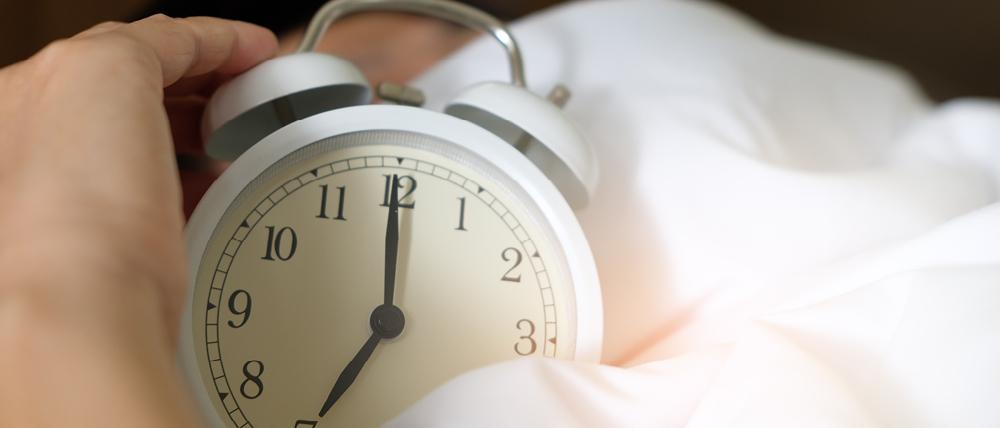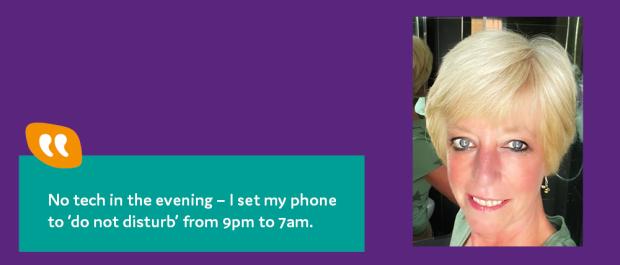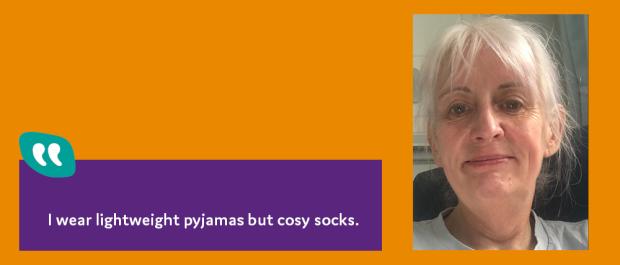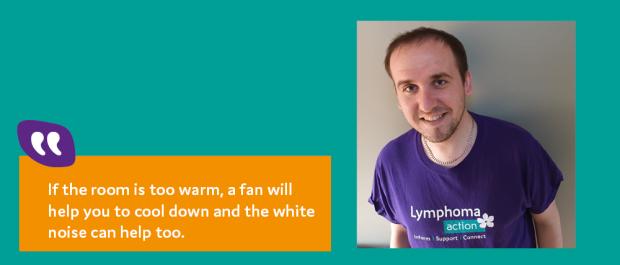Top tips for difficulty sleeping
Many of us have problems sleeping from time to time. We might find it hard to 'switch off' and fall asleep, to stay asleep, or might find ourselves sleeping for a lot of the time. Having lymphoma can also have an impact on your sleep, from concerns or worries going around your mind, the symptoms of lymphoma such as fatigue or night sweats, or the side effects of treatment.
We asked members of our Facebook group for their 'top tips' and suggestions for those times when they struggle to get to sleep. Here is what they told us.

Create the right environment
- Avoid using 'tech' (such as your mobile) in the evening as it can be quite stimulating.
- Avoid having a TV or blue light devices (such as mobiles, laptop and tablets) in the bedroom.
- Use ear plugs if you are disturbed by noise.
- Have a relaxing, uncluttered and dark space to sleep in.
- Using black-out blinds can help if there are street lamps outside, or you are woken by the light outside.
- Using a sleep mask or wearing a soft headband that covers your eyes might help. You can also find headbands that connect to your phone so you can play relaxing music or white noise (or whatever helps you sleep).
- Using an electric diffuser with sleep oil might help, and they often have an automatic timer so they turn off after a length of time.
- Spray the pillow with a lavender spray or special sleep spray (and roll on pulse points). You may like to check this with your doctor if you have any other conditions or sensitivities.

Preparing for bed
- Develop a routine: try to go to bed at same time every evening and get up at the same time each morning.
- Avoid caffeinated drinks after 3pm: try decaffinated drinks or herbal teas instead.
- Avoid alcohol or try keeping to a minimum.
- Don’t go to bed hungry. It can be helpful to have a light snack and warm milk, but leave a couple of hours between eating a big meal and going to bed.
- Having a tepid shower when it's hot, or a warm lavender bath in the winter, can be relaxing.
- If you are having night sweats, using a dog cooling mat might help to keep the pillow cool.
- Wearing lightweight pajamas so you don't get too hot, or cosy socks if your feet get cold.

...and so to sleep
- There are lots of relaxation and meditation apps available, and some you can access for free. Search your app store for more information.
- Have the radio on low and listen to calming music or a story or audio book, or the BBC sounds mindfulness recordings.
- Try mindfulness, there are courses online.
- Read a few pages of a book until you are sleepy.
- Mental exercises, for example going through the alphabet and naming countries, plants, rivers (it's less boring than counting sheep).

If you still struggle
- Sometimes it can be hard to sleep at night if you've had naps during the day. If you can, try to avoid napping (although relaxing can be helpful).
- Get out of bed, have a warm drink, and read or do a puzzle until you are sleepy, then go through routine again.
- Easier said than done, but try not to worry about not sleeping. Worrying can make it harder to get to sleep.
- Remember that some medications might also affect your sleep. For example, steroids can affect your sleep pattern. If you are on medications that you think might be affecting your sleep, talk to your healthcare team about this.
.... and finally
- Attendees at our Special Focus Meeting focussing on Difficulty Sleeping recommended the Sleepio app and the Calm Carry device.
- The practice of ‘cognitive shuffling’ was also discussed as being helpful to fall asleep. Cognitive shuffling is when you think of a word, and then think of as many other words as you can that start with first letter of the first word. And then move on to the second letter of the first word, and so on. With each word you think of, you try and imagine that thing for a few seconds. (You can find more about this technique by searching online).
Read more about lymphoma and sleep.
The Mental Health Foundation have a guide on how to sleep better.
If you have persistent problems with sleeping, you might like to talk to your medical team about what might be helpful for you.
This information comes from our Facebook users and online support meeting members, and is a list of suggestions from the community based on what they personally found useful and what they would like to pass on to others. This is not intended to be medical advice and is not a replacement for advice from your medical team. If you are looking for specific guidance for your own personal circumstances always consult your medical team.
